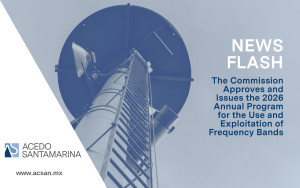On September 19, 2025, the Decree approving the Sectoral Program of the Digital Transformation and Telecommunications Agency 2025–2030 (the “Sectoral Program”) was published in the Official Gazette of the Federation (in Spanish, “DOF”). The Sectoral Program will enter into force on September 20, 2025, and is aligned with the National Development Plan 2025–2030, as well as with Mexico’s international commitments under the 2030 Agenda for Sustainable Development.
The Sectoral Program seeks to establish the guiding framework for Federal Government action, through the Digital Transformation and Telecommunications Agency (the “Agency”), to foster public-sector innovation, promote digital inclusion, and reduce the digital divide. It also aims to consolidate a digital public administration model centered on people and the effective exercise of their rights.
To this end, the Sectoral Program sets out six core objectives designed to address territorial, social, and technological gaps in access to digital services, with particular focus on rural areas, indigenous communities, and highly marginalized contexts:
- Ensure effective access to telecommunications and internet services by providing affordable, efficient, and high-quality connectivity for the entire population, with priority given to rural areas and “Polos del Bienestar”.
- Guarantee access to digital identification and simplified, digitalized government procedures.
- Strengthen the security and protection of systems providing digital services to Federal Government agencies and entities.
- Promote the development of satellite and space infrastructure through the Mexican Space Program, in order to ensure continuity of critical services, expand connectivity in remote areas, and safeguard technological sovereignty.
- Develop public technology and domestic capabilities, prioritizing data sovereignty and the use of data intelligence to enhance government performance and decision-making.
- Ensure equitable access to postal services, under principles of quality, security, affordability, and technological innovation.
The Sectoral Program establishes 30 strategies, each with corresponding lines of action, whose implementation will be evaluated annually through specific indicators. The Agency, in coordination with other authorities, will monitor progress throughout the duration of the Sectoral Program.
Although primary responsibility for implementation lies with the Agency, the Sectoral Program expressly recognizes that public and private investment, as well as international cooperation, are fundamental to achieving its objectives. In this regard, it is comparable to the Sectoral Program on Infrastructure, Communications, and Transportation 2025–2030, where private-sector participation plays a key role through public-private partnerships, bidding processes, and the granting of concessions.
It remains pending for the Agency to issue the guidelines that will define the practical operation of the Sectoral Program. Close monitoring will therefore be critical to determine whether the private sector will be able to actively participate in meeting its objectives, or whether the Agency will assume these functions directly, pursuant to the recent amendment to its Internal Regulations published in the DOF on September 4, 2025.
At Acedo Santamarina, S.C., we remain at your disposal to provide advice on the scope and implications of the Sectoral Program.





